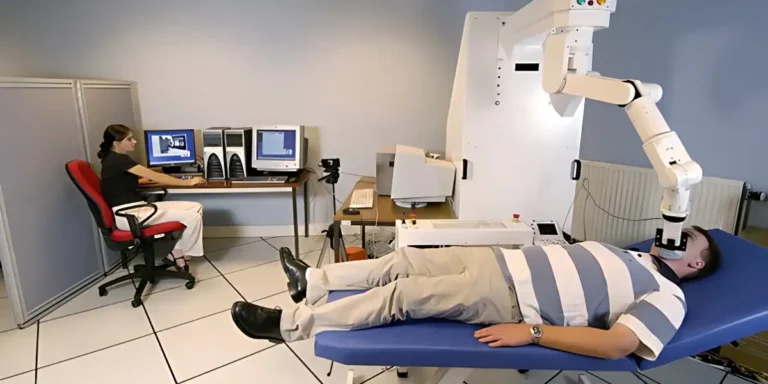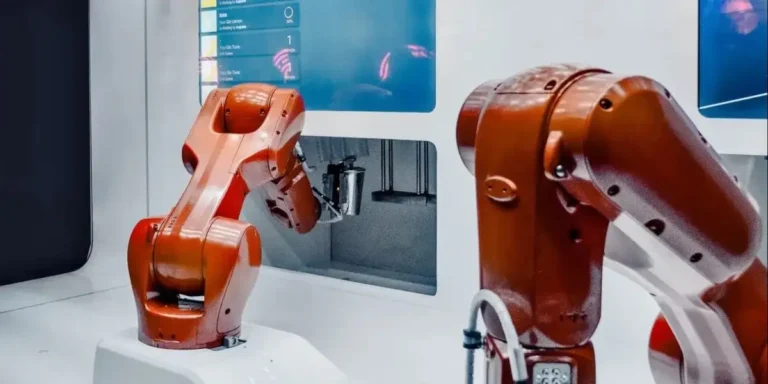The rise of artificial intelligence (AI) has sparked debates and speculation about the future of various industries, and the field of stock trading is no exception.
As AI continues to develop and demonstrate its capabilities, many are left wondering: will AI replace stock traders?
In this blog post, we will explore the potential impact of AI on the stock trading industry.
We’ll also discuss the following:
- Example Of AI Trading System
- Top AI Trading Bots
- Factors Prevent Ai Replacement In Stock Trading
- Skills And Knowledge Required For Traders
- Ethical Consideration And Potential Risk Of AI In Stock Trading
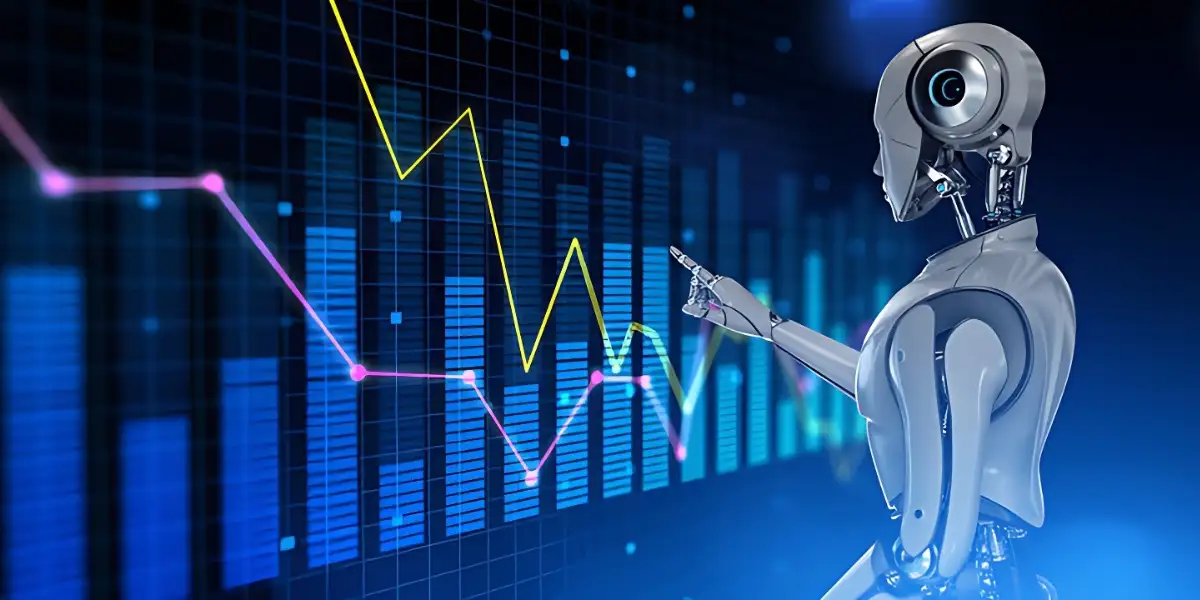
Will AI Replace Stock Traders?
No, AI will not completely replace stock traders. While AI can automate certain processes and provide useful insights, it lacks the human expertise and judgment needed to make nuanced decisions based on context.
AI will likely be integrated into the work of stock traders rather than replace them entirely.
Job Market Trends And Potential Impact On Stock Trading Careers Due To AI
AI is increasingly being used in the financial sector:
With the growing adoption of AI technologies in the financial sector, many traditional jobs, including stock trading, may be impacted.
For instance, AI tools can help analyze market data and predict market trends, which may reduce the need for human analysts and traders.
Automation of Trading Processes:
One of the most significant impacts of AI on the stock trading industry is the automation of trading processes.
With the help of AI algorithms, traders can now execute trades automatically without human intervention.
This trend has reduced the number of human traders required to execute trades, resulting in job losses in the industry.
The demand for AI skills is increasing:
While job postings requiring AI skills still represent a very small share of overall job postings, the demand for AI skills is increasing.
According to a report by the World Economic Forum, there are 99 jobs that are consistently growing in demand across 20 different industries.
Many of these jobs require AI skills, such as machine learning engineers and data scientists.
The Emergence of New Job Roles:
The emergence of AI technology has led to the creation of new job roles in the stock trading industry.
For example, AI-powered trading algorithms require regular monitoring, testing, and refinement, leading to new job roles such as AI model validation analysts, algorithmic traders, and algorithmic portfolio managers.
Increased Efficiency and Accuracy:
AI technology has improved the efficiency and accuracy of stock trading processes.
AI algorithms can analyze vast amounts of data in real time and make informed trading decisions quickly.
This has resulted in increased efficiency and accuracy in trading, reducing the likelihood of errors and improving overall performance.
Impact on Traditional Trading Strategies:
AI technology has impacted traditional trading strategies, leading to the development of new, AI-powered trading strategies.
For example, algorithmic trading strategies are designed to take advantage of market patterns and trends identified by AI algorithms.
Traditional traders who are not familiar with AI technology may find it challenging to adapt to the new AI-powered trading strategies, leading to a potential loss of jobs.
Examples Of Successful AI-Driven Trading Systems
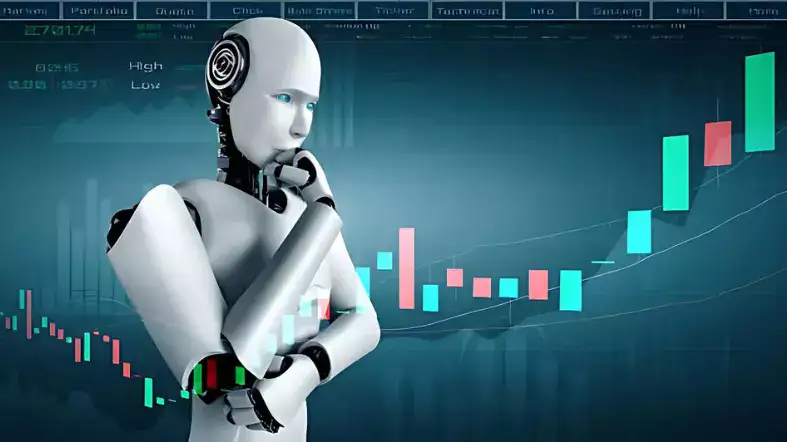
Renaissance Technologies – The Medallion Fund
In the world of AI-driven trading, Renaissance Technologies’ Medallion Fund stands as a shining example of success.
Mathematician Jim Simons founded this hedge fund, which has consistently achieved extraordinary returns using AI algorithms.
The fund’s success can be attributed to its ability to analyze vast amounts of historical data and identify hidden patterns that human traders might overlook.
By employing sophisticated machine learning techniques, the Medallion Fund’s AI system continually adapts and evolves its trading strategies based on market conditions.
This adaptive approach allows the fund to capitalize on opportunities while minimizing risks.
As a result, the Medallion Fund has delivered exceptional returns to its investors, consistently outperforming traditional investment strategies.
Two Sigma Investments – Data-Driven Insights
Another notable player in the AI-driven trading arena is Two Sigma Investments.
Founded by David Siegel and John Overdeck, Two Sigma has made significant strides by leveraging AI algorithms and big data analytics.
At the heart of Two Sigma’s success is its ability to collect and analyze vast amounts of structured and unstructured data from diverse sources.
Their AI system can make data-driven trading decisions by extracting valuable insights from this data.
For instance, the system may examine economic indicators, news sentiment, social media trends, and even satellite imagery to gain an edge in the market.
Sentient Technologies – Evolutionary Algorithms
Sentient Technologies has taken a unique approach to AI-driven trading by harnessing the power of evolutionary algorithms.
Inspired by nature, these algorithms mimic the process of natural selection to evolve trading strategies over time.
Sentient’s AI system generates multiple trading strategies and evaluates their performance using historical data.
It then combines and mutates the most successful strategies to create new variations.
This iterative process continues, allowing the system to refine its strategies and adapt to changing market conditions.
The result is an AI system capable of continually improving its performance and generating impressive returns for its users.
Man AHL – Machine Learning and Neural Networks
Man AHL, a leading systematic investment manager, has embraced machine learning and neural networks to drive its trading strategies.
Their AI system analyzes large volumes of data, including market prices, news, and economic indicators, to identify patterns and predict future market movements.
By training neural networks on historical data, Man AHL’s AI system can learn complex patterns and relationships that are difficult for humans to discern.
This enables it to make precise predictions and execute trades accordingly.
The integration of machine learning and neural networks has proven highly effective for Man AHL, allowing them to navigate volatile markets and achieve consistent returns.
DE Shaw & Co. – Quantum Computing
DE Shaw & Co., a renowned investment management firm, has ventured into the realm of quantum computing to enhance its AI-driven trading systems.
Quantum computing harnesses the principles of quantum mechanics to perform complex computations at an astonishing speed.
By leveraging quantum computing power, DE Shaw & Co.’s AI system can process vast amounts of data and perform unprecedented optimizations.
This allows them to uncover subtle trading opportunities and execute trades with remarkable precision.
While quantum computing is still in its early stages, DE Shaw & Co.’s foray into this technology highlights its immense potential for AI-driven trading.
Top 7 AI Stock Traders Bots
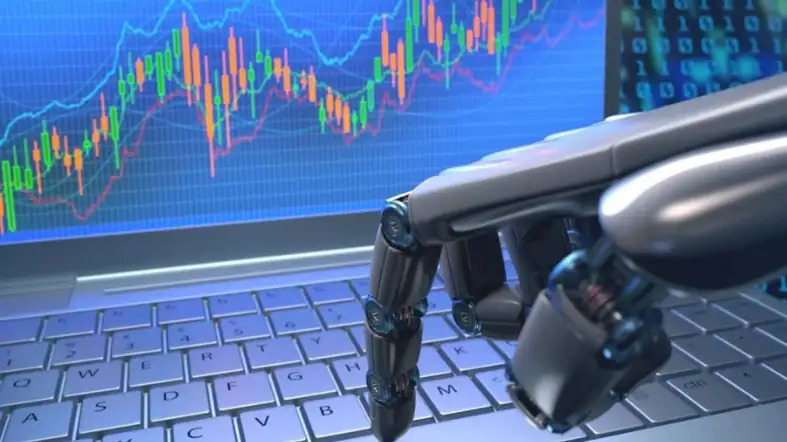
Tickeron:
Tickeron is an advanced platform that harnesses the power of AI to offer a wide range of trading options.
Their AI Robots constantly scan stocks and ETFs every minute, providing real-time information on potential profit levels and stop loss levels for bought and sold trades.
This real-time data can be invaluable for traders looking to make informed decisions.
The platform is highly customizable and offers various AI trading systems to suit individual preferences and trading strategies.
Trade Ideas:
Trade Ideas is a reputable platform renowned for its automated AI trading bots designed specifically for stocks.
With a proven track record, Trade Ideas provides day trading bots platforms that execute buy and sell orders automatically.
Their software employs AI algorithms to identify trading opportunities and execute trades, making it an attractive choice for those seeking AI stock software for profitable day trading.
The platform’s automation capabilities and focus on stocks make it a popular choice among traders.
Equbot:
Equbot is an AI-driven stock trading bot that sets itself apart by combining IBM Watson technology with ETFs and AI data.
By leveraging AI capabilities, Equbot aims to empower users to make astute investment decisions.
The platform’s unique approach of blending AI and ETFs allows traders to access a diversified range of investment opportunities.
With the integration of IBM Watson technology, Equbot offers advanced analytics and insights to support traders in their decision-making process.
Algoriz:
Algoriz is an AI software that provides a user-friendly interface for creating, backtesting, and automating trading strategies in equities and cryptocurrencies.
One of the platform’s notable features is its support for various cryptocurrencies, including Bitcoin, Ethereum, and XRP.
By connecting users to different data vendors, Algoriz enhances the breadth of available data for traders to develop and refine their strategies.
The platform’s focus on equities and cryptocurrencies, coupled with its automation capabilities, makes it a versatile choice for traders in these markets.
TrendSpider:
TrendSpider is a comprehensive and widely used artificial intelligence stock trading software.
It offers automated technical analysis assistants and a fully-customizable engine for professional trading.
Traders can leverage TrendSpider’s advanced technical analysis tools to identify trends, patterns, and potential trading opportunities.
The platform’s popularity can be attributed to its robust AI-driven analysis capabilities, which enable traders to make data-informed decisions and optimize their trading strategies.
Kavout:
Kavout is a specialized AI bot for stock trading that has garnered recognition as one of the top seven AI bots for stock trading in 2023.
While specific details about its functionality are not provided in the search results, its inclusion in this list suggests its credibility and relevance in the AI trading landscape.
Traders interested in Kavout may explore the platform further to gain insights into its unique features and capabilities.
Factors That May Prevent Complete AI Replacement In Stock Trading
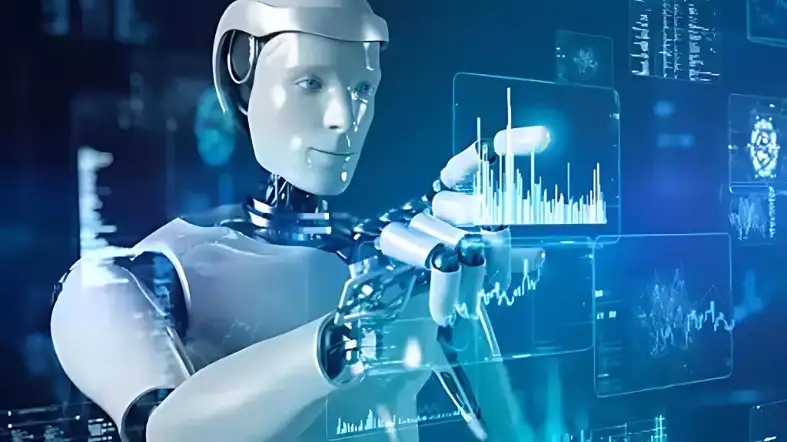
Human Expertise and Decision-making
While AI can perform complex calculations and analysis, it lacks the intuition and decision-making skills of experienced traders.
Traders often rely on their gut instincts to make quick decisions based on market trends and news that may not be reflected in data analysis.
For instance, suppose a company releases a new product that creates a lot of buzz in the market.
In that case, an experienced trader may decide to invest in that company, even if the data analysis does not support the investment.
On the other hand, an AI system may not recognize the importance of the buzz and may miss out on the investment opportunity.
Market Volatility and Unexpected Events
The stock market is highly volatile and can be influenced by a wide range of unexpected events, such as natural disasters, political instability, or pandemics.
Such events may not have any historical data or patterns for AI systems to learn from, making it challenging for them to make accurate predictions.
For instance, during the COVID-19 pandemic, the stock market experienced a sudden downturn, and many AI systems failed to predict it.
The pandemic was an unprecedented event, and there was no historical data to analyze.
Experienced traders, however, were better equipped to handle such unexpected events and quickly adapt to the changing market conditions.
Overreliance on Historical Data
AI systems rely heavily on historical data to make predictions about future market trends.
However, stock markets are not always predictable, and past trends may not always be indicative of future performance.
Overreliance on historical data can lead to inaccurate predictions and investment decisions.
For instance, suppose an AI system relies solely on past trends to make investment decisions.
In that case, it may miss out on new emerging trends and investment opportunities that do not have any historical data.
Technical Errors and Cybersecurity Threats
AI systems are vulnerable to technical errors and cybersecurity threats that can compromise the accuracy of their predictions.
Technical errors such as bugs, glitches, or data input errors can result in inaccurate predictions and investment decisions.
Cybersecurity threats such as hacking or malware attacks can compromise the security and confidentiality of the data used by AI systems.
For instance, suppose an AI system is hacked or infected with malware.
In that case, the attackers can manipulate the data used by the system, leading to inaccurate predictions and investment decisions.
Legal and Ethical Considerations
AI systems in stock trading raise legal and ethical concerns, such as accountability and transparency.
Suppose an AI system makes a wrong investment decision that results in significant financial losses.
In that case, it may be challenging to hold the AI system accountable for its actions.
There may also be concerns about the transparency of the decision-making process of AI systems, which can lead to mistrust and suspicion among investors.
Skills And Knowledge Required For Future Stock Traders
Research and Analytical Skills
Traders need to have research and analytical skills to monitor broad economic factors and day-to-day chart patterns that impact financial markets.
They should be able to conduct extensive research on companies and industries, analyze market trends and news, and interpret financial statements.
Additionally, they must have the ability to identify trends, anticipate changes in the market, and make informed trading decisions based on their analysis.
Ability to Focus and Concentrate
Traders must have the ability to focus and concentrate, particularly in a fast-paced and dynamic environment.
They need to be able to analyze vast amounts of information and make quick decisions based on their analysis.
Successful traders can maintain their focus even under high-pressure situations and avoid making emotional decisions that could negatively impact their trades.
Risk Management Skills
Stock traders must have good risk management skills to manage their portfolios and minimize their losses.
They should understand the risks associated with different types of trades and implement appropriate risk management strategies, such as stop-loss orders and diversification.
By managing risks effectively, traders can protect their capital and minimize the impact of losses on their trading performance.
Discipline and Patience
Successful traders have the discipline to follow their trading strategies consistently and patiently wait for the right opportunities to make trades.
They must be able to control their emotions, such as fear and greed, which could cloud their judgment and negatively impact their trades.
By exercising discipline and patience, traders can avoid impulsive decisions and improve their trading performance over time.
Technical Skills
Stock traders must have the technical skills to use trading platforms and tools effectively.
They should be familiar with trading software, charting tools, and other technical indicators that could help them analyze market trends and make informed trading decisions.
Additionally, traders should understand trading terminology well, such as bid-ask spread, volume, and price action, to communicate effectively with other traders and market participants.
Ethical Considerations And Potential Risks Of AI Trading Systems
Lack of Ethical Reflection:
The governance of systemic risks in finance has highlighted that Artificial Intelligence (AI) can contribute to systemic risks without reflecting on its ethical implications.
AI can assist in enhancing trading efficiency but can also lead to unethical practices like insider trading or market manipulation.
It is imperative to understand that AI trading systems can amplify the unethical practices that are already prevalent in the financial sector.
This emphasizes the importance of ethical considerations in the development and use of AI systems in trading.
Ethical reflection is necessary to identify potential risks and develop strategies to mitigate them.
Neglect of Systemic Effects:
The ethical considerations of AI often disregard the systemic effects of technology.
AI trading systems have the potential to impact entire markets and economies, and the ethical considerations of these impacts need to be carefully considered.
The impact of AI trading systems is not limited to its users and can extend to society at large.
The potential systemic effects of AI trading systems require a holistic approach toward ethical considerations.
A comprehensive understanding of these impacts can facilitate the development of ethical frameworks that address systemic effects.
Adherence to Ethical Standards:
The development and use of AI trading systems require ethical standards to prevent unfair advantages, financial harm, or discrimination.
Ethical standards are necessary to ensure that AI trading systems adhere to the values and principles that guide moral conduct.
Ethical standards help prevent unethical practices and ensure that AI trading systems are designed to uphold ethical values.
It is essential to develop and enforce ethical standards to prevent the misuse of AI trading systems and safeguard against unethical practices.
Data Bias:
AI systems rely on the quality of the data they are trained on. Biased or incomplete data can lead to unfair decisions and potentially disastrous financial outcomes.
Suppose an AI trading system is trained on historical data with a bias towards one particular industry.
In that case, it may not accurately predict the behavior of other industries and lead to incorrect trades.
It is necessary to address data bias to ensure that AI trading systems make unbiased decisions.
Using diverse data sets and pre-processing techniques can minimize data bias and improve the accuracy of AI trading systems.
Transparency and Explainability:
The lack of transparency and explainability in AI trading systems can lead to confusion and mistrust in the system, especially if it makes a significant financial decision that negatively impacts investors.
Therefore, it is important to ensure that AI trading systems are designed to be transparent and explainable to avoid confusion and mistrust.
Transparency and explainability promote accountability and trust in AI trading systems.
This is essential in ensuring that AI trading systems are used ethically and are perceived as trustworthy.
Overreliance on AI:
AI trading systems should not be relied upon entirely, and human intervention should be present in the decision-making process to ensure that ethical considerations are taken into account and to prevent potential harm caused by the system.
Overreliance on AI can lead to a lack of human oversight, which may result in unethical practices.
The role of human oversight is to ensure that AI trading systems align with ethical standards and do not deviate from the intended ethical framework.
FAQs
What Is The Current Role Of AI In Stock Trading?
AI is already playing a significant role in stock trading.
One of the primary benefits of AI is its ability to make accurate predictions based on massive amounts of data in a short amount of time.
Predictive AI can help traders make wise investment decisions and identify market trends quickly.
Will AI Make Investment Decisions On Its Own?
While AI can make predictions about market trends and movements, it is unlikely that it will make investment decisions on its own.
AI lacks human intuition and creativity and cannot adapt to unforeseen circumstances.
Instead, human traders are likely to use AI as a tool to inform their investment decisions.
What Are The Benefits Of Incorporating AI Into Trading?
Incorporating AI into trading can provide several benefits, including the ability to analyze large amounts of data quickly and accurately, identify market trends and movements, and make predictions about future market movements.
This can help traders make wise investment decisions and identify opportunities that may not be apparent to human traders.
Conclusion:
Though intriguing, AI replacing stock traders is unlikely in the near future.
AI can’t mimic the stock market’s complexity, human intuition, judgment, and adaptability. Instead, AI will enhance stock traders’ decision-making.
Stock trading may improve efficiency, accuracy, and profitability by using AI and humans.
As AI technology advances, we must embrace its opportunities while acknowledging the unique skills of human stock traders.
Human-AI collaboration could transform how we trade the stock market and lead to smarter, more informed trading decisions.

